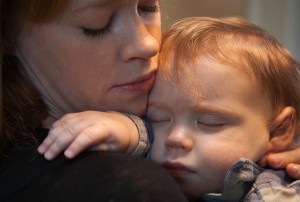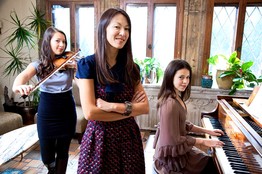Emily Rapp is a self-proclaimed Dragon Mom.
Her baby son, Ronan, is almost certainly going to die before he turns three. He was born with Tay-Sachs, a genetic disease for which there is no cure.
Such a horrible fact has spawned Rapp’s unique philosophy on parenting, one that sits in stark contrast to that of Tiger Mothers, soccer moms, and just about every other type so predicated on a future—something children like Ronan simply don’t have.

Emily Rapp and her son Ronan
In an affecting and personal piece for the New York Times last week, Rapp lays bare the unavoidable contradiction between traditional parenting and having a terminally ill child. “Parenting advice is, by its nature, future-directed,” she writes. What kind of food to feed them, what sports and activities to start them in, how much TV should be allowed; all consider the long-term implications such decisions will have on a child’s growth and development. All become irrelevant for a child with no future.
Earlier this year, Yale law professor Amy Chua fueled controversy with her book Battle Hymn of the Tiger Mother, in which she appears to promote an aggressive style of parenting thought to be prevalent in the Chinese community. Chua detailed the extremely proactive role she took in her daughters’ lives: forcing them to practice piano for hours until they could play a passage correctly, accepting nothing less than As in their classes. Such practices were based on the premise that they would ensure the child’s success in life. On the flip side, she implied that free-spirited American-style parenting coddled children and produced lazy, directionless adults.

Amy Chua and her daughters
Critics took offense at her portrayal of “Asian” parenting, and response articles poured in advocating a gentler approach that nurtured children’s creativity and promoted the making of their own choices. This, many parents believe, produces happy, independent-minded adults.
Even such vigorous and all-encompassing debates as these, however, tend to lose meaning when applied to a situation like Ronan’s.
According to Rapp, Dragon Mothers and Fathers have completely different goals: “to help our children live with minimal discomfort and maximum dignity.” Dragon parenting emphasizes the here and now, in a horrible way obliterating the nonexistent future that simultaneously makes the present more precious.
I will love him to the end of his life, and then I will let him go.
The tragedy of dragon parents can perhaps provide a valuable lesson to all parents. Even the most certain future can be stolen away. As important as the planning, the decisions, the preparation for adulthood can seem, dragon parents remind us to love our children today, while we are all still here.
This is what Emily Rapp has decided to do. “I can protect my son from as much pain as possible,” she writes, “and then finally, the hardest thing of all, a thing most parents will thankfully never have to do: I will love him to the end of his life, and then I will let him go.”

 Dragon Mothers: How to Parent a Dying Child
Dragon Mothers: How to Parent a Dying Child


 “In Case You Don’t Live Forever” by Ben Platt
“In Case You Don’t Live Forever” by Ben Platt
 Our Monthly Tip: Make an “In Case of Death” File to Ease Loved One’s Grief
Our Monthly Tip: Make an “In Case of Death” File to Ease Loved One’s Grief















